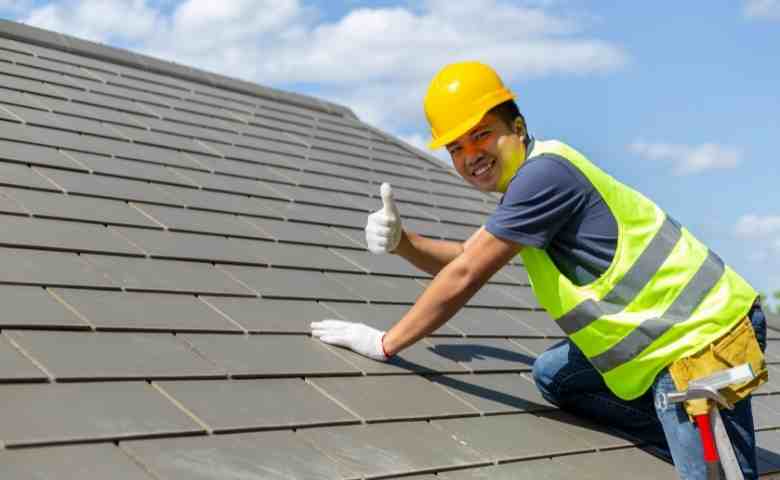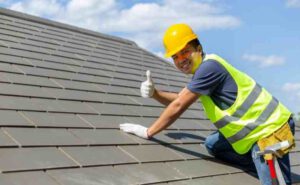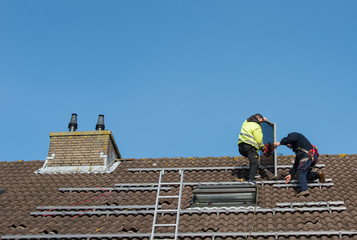Safety Precautions For Roofers

Roofing is a process that requires skilled and trained roofers to complete. In many cases, these workers are part of crews that re-roof homes. They may also be involved in other aspects of the re-roofing process, such as the installation of plants and landscape materials. For more details, read on Roofers Greensboro NC.

Roofing is an industry that requires skilled, knowledgeable, and professional roofers to install new roofs on homes and commercial buildings. This work involves a variety of challenges that require a good understanding of the construction process and how to address unexpected problems. In addition to the job of putting a new roof on a home, a roofing contractor must also be able to safely dispose of discarded building material.
The roofing industry changes often, so roofing contractors must be able to keep up with the latest technology. They must also be willing to invest in the necessary equipment to ensure that their jobs are completed efficiently and with the highest quality. Some companies may even send employees to personal development conferences to learn about new techniques and how to improve their skills.
Many roofing contractors are familiar with the different types of roofing materials available. Some specialize in metal or shingle roofs. They will also know how to improve the look of the house by installing siding. The best roofers are eager to discuss their past projects with prospective customers. They will have connections to recycle old roofs and will be able to provide you with estimates on the cost of carting debris away from the site.
During a roofing job, the roofer will be responsible for tearing off the old roof, installing the new one, and repairing the decking. They will have to be able to follow the instructions of the project foreman. They will have to use safety equipment, and they will need to be able to measure and order the necessary materials. They will also have to be able to respect the homeowners and their property. They should be able to obtain a permit for the job, and they should be able to dispose of any old roof or shingles.
Roofers must be able to follow city and municipal building codes. They should be able to use safe and effective methods for measuring, and they should be able to communicate effectively with their suppliers. They will also need to be able to work with a team of other contractors and subcontractors.
Roofing is an industry that involves a lot of physical labor, and it is important that workers be able to handle heights. Roofing contractors need to be able to demonstrate that they are able to stay safe at all times, and they should show that they are willing to learn.
A qualified residential roofer will be able to respond to an emergency, and they will have the necessary tools and equipment to complete the job quickly and efficiently. They will also be able to work with a team to improve the overall quality of their work. They will be able to invest in the proper equipment and materials to improve the quality of their work.
Roofing work is a dangerous job, and roofers must take necessary precautions to avoid accidents. Safety precautions for roofers should include wearing proper PPE at all times and taking care of equipment before using it. There are many hazards associated with roof work, including falls, chemical exposure, electrical hazards, and slippery conditions. While many of these risks can be avoided with proper safety equipment and procedures, there are some that cannot.
Falling is one of the most common causes of injury and death in the construction industry. According to the National Institute for Occupational Safety and Health, over 34% of all fall fatalities in the construction industry occur on rooftops. This is mainly because of the height and the slope of roofs. To prevent falls, workers should use a safety harness and a lifeline. In addition, a safety vest may also be necessary to alert people around the worker.
If you work on a gravel or slate roof, you will need to take special precautions to prevent damage. Loose tiles can fall out of these roofs, which can be dangerous for inexperienced roofers. Investing in the right tools and training will reduce these risks. Additionally, you should take into consideration your workload and the weather.
When working on a wet or snowy roof, you should wear soft rubber-soled shoes. You should also wear long sleeves and a hood to keep warm. Be sure to clean the bottoms of your shoes regularly. Other precautions include avoiding slippery conditions such as rain and ice, keeping the roof clean, and reporting any hazard to your supervisor.

